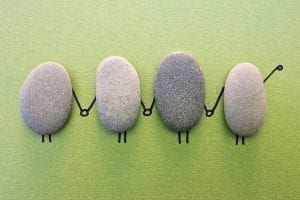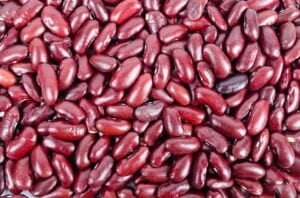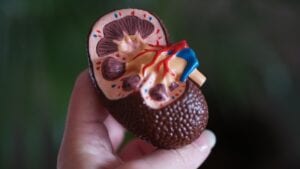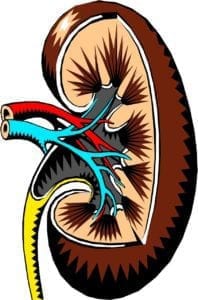Kidney Stones
What are kidney stones?
Kidney stones (renal lithiasis, nephrolithiasis) are small mineral and acid salt deposits that form inside the kidneys. They resemble pebbles, hence the term “stones.” There are a few types of kidney stones:- Calcium stones – the most common form, caused by excess calcium oxalate or calcium phosphate
- Struvite stones – this type forms in response to infection, like a urinary tract infection
- Uric acid stones – this type often results when insufficient fluids are ingested, as well as those with gout or eat a high protein diet (genetics can also play a factor)
- Cystine stones – this type is as a result of a hereditary disorder that causes the kidney to release an excess amount of amino acids
What are the symptoms of kidney stones?
Some of these stones can stay in the kidney and cause no harm. But often, these stones can become painful and cause problems. They include:- Sharp pain in the back, side, abdomen, or groin
- Hematuria (pink, red, or brown urine) or cloudy urine
- Constant urination or inability to urinate
- Painful urination
- Nausea and vomiting
- Fever
What cause kidney stones?
Kidney stones form when urine contains more crystal-forming substances — such as calcium, oxalate and uric acid — than the fluid in urine can dilute. And while the exact cause as to why these minerals form in this way cannot be attributed to a single cause, several factors may increase risk:- Constant low urine volume as a result of dehydration or environmental/climate factors
- Consuming an excess of certain foods (sodium, animal protein, legumes, etc.)
- Certain bowel conditions
- Obesity
How are kidney stones diagnosed?
Ways to diagnose kidney stones include:- Blood test
- Urine test
- X-Ray exam
- Ultrasound
- CT scan
What are the treatments available for kidney stones?
Treatment depends on the type of stone and severity of pain/discomfort at the moment. Often, passing the stones by urinating is the best treatment. The medicine tamsulosin may be taken to help pass them. For large stones, other treatment options include:- Shock wave lithotripsy (SWL)
- Ureteroscopy
- Percutaneous nephrolithotomy
- Surgery
Where can I find out more about kidney stones?
Kidney Stones Articles

Primary Hyperoxaluria Drug’s Label Receives Expansion to Include Patients with More Severe Disease
James Moore
December 19, 2022
Read More »

Study of Veterans Suggest Kidney Stones Associated with Osteoporosis
Jessica Lynn
March 29, 2021
Read More »


An Experimental Treatment for Primary Hyperoxaluria has Earned Rare Pediatric Disease Designation
James Moore
June 24, 2020
Read More »


“I Would Do it Again in a Heartbeat”, This Sister Donated Her Kidney, Gifting Her Brother His Health
Sunniva Bean
March 23, 2020
Read More »

Alnylam Seeks FDA Approval for First Treatment of Primary Hyperoxaluria Type 1
Kendall Mason
January 2, 2020
Read More »

The Controversy of Noncompete Clauses and Their Effect on Rare Disease Patients
Trudy Horsting
March 27, 2019
Read More »


